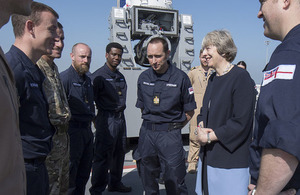PM to boost defence and security co-operation with Gulf allies
Prime Minister Theresa May announces a new package of joint measures with the Gulf that will tackle terrorism and bolster security.

Prime Minister meeting Royal Navy personnel on board HMS Ocean in Bahrain.
To keep British people safe at home and overseas, the Prime Minister will today (6 December 2016) announce a robust new package of joint measures with the Gulf to tackle terrorism and bolster our joint security.
At a meeting of leaders from the 6 Gulf countries in Bahrain, the Prime Minister will announce new co-operation with the Gulf to strengthen aviation security, specifically by working with these countries to more effectively implement traveller screening systems and sharing expertise to make it more difficult for terrorists to avoid detection at any airport in the region.
In a series of additional security measures, the Prime Minister will also announce:
-
the establishment of a new joint UK-GCC Working Group on Counter-Terrorism and Border Security to build on existing border security co-operation and efforts to counter terrorist financing and to protect critical national infrastructure
-
additional counter-terrorist financing training with individual Gulf partners, with the first workshop due to take place in Qatar next week
-
the appointment of 3 UK specialist cyber experts to help build capability in Gulf institutions, with these experts due to make their first visits to the region later this month
-
intensified co-operation to counter violent extremism, including through new Gulf Co-operation Council (GCC) support for national action plans to prevent and counter violent extremism
Building on the government’s £3 billion investment in defence in the region over the next decade, the Prime Minister will also announce a new UK-GCC strategic partnership aimed at developing GCC defence capacity, capability and interoperability, including for humanitarian and peace support operations, and combined crisis response planning.
The Prime Minister will also announce further UK deployments to the region with a new permanent British Defence Staff in Dubai to coordinate regional activities and a dedicated military officer embedded with Bahrain’s Ministry of Interior bomb disposal unit to provide bomb scene management support and training.
Ahead of the visit, the Prime Minister said:
Now more than ever, Gulf security is our security. That’s why we are investing in hard power there, with over £3 billion of defence over the next decade – spending more in the Gulf than in any other region of the world.
Through the construction of HMS Juffair, we are creating a permanent naval base in the region, the first such facility east of Suez since 1971. And we are also establishing a permanent British army presence in the region through our regional land training hub in Oman. Indeed, there are more British warships, aircraft and personnel deployed on operations in the Gulf than in any other part of the world.
And it’s not just about military power, we also need to work together to respond to new and diversifying threats. So, on my visit here, we are agreeing new co-operation to do more to prevent radicalisation and to tackle terrorism.
In all of these ways, I am determined to step up our defence and security partnership to provide greater confidence and stability to the region and to keep our people safe in an ever more dangerous world.
The Prime Minister paid a visit to armed forces personnel on board HMS Ocean today at the Khalifa Bin Salman Port in Bahrain. She received a short operational briefing, toured the ship and made an informal address to the gathered ship’s company on the flight deck. HMS Ocean is the Royal Navy fleet flagship and an amphibious assault ship. The 900 personnel on board are drawn from 845 Naval Air Squadron, 662 Army Air Corps, 27 Squadron RAF and 42 Commando.
HMS Ocean set sail from her home port in Plymouth on 19 September for a 6-month deployment as part of the inaugural Joint Expeditionary Force (Maritime) Task Group, conducting joint exercises with partners in the Mediterranean and the Gulf. She is currently providing the command platform for vital operations in the Middle East, directing US Task Force 50 and maintaining the free flow of trade, freedom of navigation for shipping and regional security in the area.
The UK’s security relationship with Gulf states has already saved lives – for example through the October 2010 discovery at East Midlands airport of a ‘printer bomb’ on board a US-bound flight, which was a direct result of information received from the Saudi authorities.
Prime Minister speaks to HMS Ocean personnel
Prime Minister speaking to HMS Ocean personnel
Find out more about the Prime Minister’s visit to Bahrain.